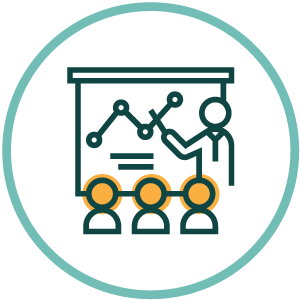Master facilitation to lead complex conversations in uncertain times.
Sign up for our expert facilitation training courses. 50% discount available until January 18, 2026!
What Is Facilitation?
What Is A Facilitator?
A facilitator acts as a neutral third party whose goal is to help create a supportive and inclusive environment where participants can effectively communicate, collaborate, problem-solve, and make decisions. Facilitation techniques can vary depending on the context and objectives of the group, but they often involve activities such as brainstorming, prioritization, group discussions, consensus-building, and decision-making exercises.
A facilitator can evoke group creativity and foster meaningful conversations through skilled question-asking that will ensure participants reach their desired outcomes.

When Is Facilitation Used?
Facilitation is commonly used in various settings, including meetings, workshops, training sessions, managing organizational development, change management initiatives, strategic planning and stakeholder engagement endeavors. It is most valuable for managing group conflict or differing perspectives.
Who Can Benefit?
Facilitation skills are vital to any leadership role. All individuals required to work with others can benefit from applying facilitation or following a facilitative approach. We made it our mission to transform the workplace and set out to make facilitation and leadership skills accessible to teams everywhere.
Why Intersol?
We have an extensive 30-year history of applying proven techniques to our clients achieve their objectives.
We have built a successful reputation solving organizational challenges through expert facilitation, consulting and leadership training.
Stay Connected

Facilitating Canada: A Look at Intersol’s National Legacy through the Eyes of Principal and Senior Facilitator, Marc Valois
When Marc Valois joined Intersol in 1996, facilitation in Canada looked a little different. There were fewer, if any, digital tools and hybrid meetings took place over a speaker phone placed in the middle of a table. But even then, the work was rooted in something deeply Canadian: bringing people

Top 4 Reasons to Invest in Facilitation Skills
In today’s fast-paced world, collaboration isn’t just a nice-to-have; it’s a necessity. Yet many teams struggle to work together effectively, often bogged down by poor communication, unclear goals, and missed opportunities for genuine connection. One way to address these challenges? Facilitation skills. Here’s why empowering teams with facilitation expertise is





